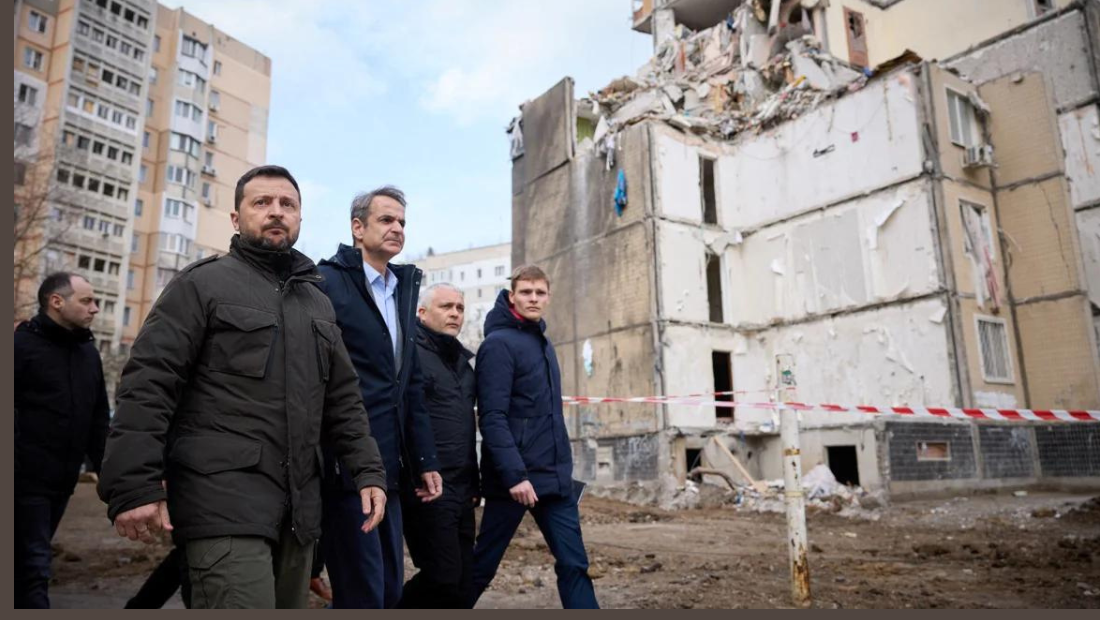07 March,2024
On March 6, an alarming event unfolded as a Russian missile struck the Ukrainian port of Odesa, causing a powerful explosion. The gravity of the situation was underscored by the presence of Ukrainian President Volodymyr Zelenskyy and Greek Prime Minister Kyriakos Mitsotakis at the port. Miraculously, the missile landed perilously close to the leaders, affording them a firsthand view of the impact. Reports indicate that the strike occurred a mere 500-800 meters away from their respective delegations.
During their visit, Zelenskyy and Mitsotakis toured a residential building that had fallen victim to a Russian drone attack, resulting in the tragic loss of 12 lives, including five innocent children. The shrill blare of sirens and the deafening explosion served as poignant reminders of the grim reality of war in Ukraine. Mitsotakis emphasized the importance of European leaders witnessing such devastation firsthand, urging them to visit and grasp the impact on civilians.
In solidarity with Ukraine, Greece, as a NATO member, remains steadfast in its support. Mitsotakis reiterated Greece’s commitment, stating, “My presence here reflects the respect of the entire free world for your people.” Despite the inherent risks, Greece stands unwaveringly beside Ukraine, extending tangible assistance by offering military aid, while also advocating for Ukraine’s NATO and European Union aspirations.
The escalation of attacks on Odesa’s port infrastructure since mid-July, following Russia’s withdrawal from a UN-brokered agreement facilitating safe passage for Ukrainian grain shipments, has exacerbated tensions. In response, Ukraine has forged its own “humanitarian corridor” for ships, attempting to bypass the de facto Russian blockade of Kyiv’s seaborne exports via the Black Sea. European Commission President Ursula von der Leyen vehemently denounced the recent attack on Odesa, underscoring the imperative for international attention and action.
As the world closely monitors unfolding events, nations like Greece remain resolute in their solidarity with Ukraine, undeterred by danger or adversity.
How has NATO responded to this situation? In response to the Russian missile strike in Odesa, NATO has expressed deep concern and condemnation. Notable reactions include:
- European Union’s Furious Response: The European Union’s top official vehemently condemned the attack as a vile intimidation tactic. Ursula von der Leyen emphasized unwavering support for Ukraine amid these trying times.
- Greece’s Solidarity: Greek Prime Minister Kyriakos Mitsotakis reaffirmed Greece’s unwavering commitment to Ukraine’s cause, offering both vocal support and tangible military aid despite the risks involved.
- NATO’s Concerns: Although NATO has not issued an official statement directly addressing this incident, the close proximity of the missile strike to Ukrainian and Greek leaders underscores serious concerns within the alliance. The incident highlights the escalating conflict and the potential risks to NATO allies in the region.
- Ongoing Monitoring: NATO maintains vigilant surveillance of the situation, particularly given the historical significance of the Black Sea port to Greece. The organization stands ready to respond promptly if necessary.
- Poland’s Experience: Poland’s own encounter with a missile strike during the conflict prompts questions about NATO’s response to such attacks, further emphasizing the gravity of the situation.
In summary, while NATO refrains from direct military intervention following the Odesa missile strike, its member states closely observe the situation, expressing unwavering solidarity with Ukraine and other affected allies.
Visit for more letest news update – sojattimes.com

